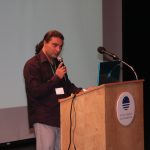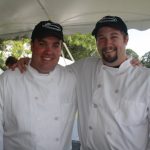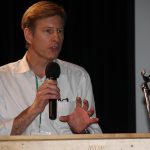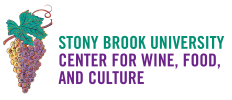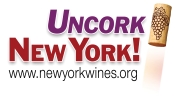August 5 & 6, 2008
The Stony Brook University Center for Wine, Food, and Culture hosted a major international symposium titled “The Art of Balance: Cool Climate/Maritime Wines in a Global Context,” at its Southampton campus on Long Island. The two-day symposium featured advanced educational presentations and wine tastings led by prominent winemakers and vineyard managers from top wineries in cool climate/maritime winegrowing regions around the world.
This event marked the 20-year anniversary of the first groundbreaking conference of its kind, “Maritime Climate Wine Growing: Bringing Bordeaux to Long Island,” which was staged in Riverhead in summer 1988 and drew participants from Chateau Margaux, Chateau Pichon-Lalande, and Institut Technique de la Vigne et du Vin, Montpelier. This new symposium for 2008 was the result of an innovative partnership between the host, Stony Brook University Center for Wine, Food, and Culture, the primary funding agency New York Wine and Grape Foundation, and the organizing committee Long Island Wine Council.
To stage this 20th anniversary symposium, owners and managers from Long Island’s own 40 wineries joined forces with some of the world’s leading wine-growers to lead two days of educational talks and wine tastings. This symposium highlighted the renewed appreciation of balanced, elegant, lower alcohol wines and afford an opportunity to talk and taste with some of the world’s leading cool/maritime climate wine producers.
The Art of Balance: Cool Climate/ Maritime Wines in a Global Context
August 5 & 6, 2008
Stony Brook Southampton, NY
Presentation Highlights
The complete video series is available on YouTube
Tuesday, August 5
Alessio Dorigo, Owner/Winemaker, Dorigo (Friuli Venezia-Giulia, Italy)
Terroir, the Global Market, and International Taste: A Friulian Approach
Born into the world of wine; brought up on a wine estate in Buttrio, in Friuli, Italy, Dorigo learned winemaking from leading Italian oenologists (Donato Lanati, Roberto Cipresso, Giuseppe Lipari). In 1998, he made his first wine without other consultants. In 2000, he and Marco Pecchiari founded “Terra e Vino,” initially a wine lab and, after two years, a consultancy office. Currently, he consults for more than 20 wineries, mostly in Friuli but also in Veneto, Franciacorta and Slovenia; and continues to make his family’s wine.
Günter Künstler, Owner/Winemaker, Weingut Küntsler (Rheingau, Germany)
Soil, Terroir, and Microclimate in the Rheingau
Wine growing is a tradition for the Künstler family which dates back to the Thirty Years war, when in 1648 they first planted grapes along the Thaya River in South Moravia (Today Czech Republic). After World War II Franz Künstler, father of Gunter Künstler, was forced to leave his home land and resettled with his family in Western Germany. In 1951 Künstler was appointed cellarmaster at the prestigious Domdechant Werner estate in Hochheim. Since 1965 Franz Künstler has run his own winery.
Thomas Laszlo, VP Winemaking Operations, Heron Hill Winery (Finger Lakes, NY)
Who Has Terroir and How Do I Get It? An Exploration of Finger Lakes Terroir with Riesling as the Guide
Laszlo joined Heron Hill in 2002 after years of experience at Niagara-on-the-Lake and Henry of Pelham Estate Winery in Ontario as well as Chateau Pajzos and Chateau Megyer in Tokaj, Hungary where he became an expert at producing Tokaji wines. Rieslings and dessert wines are his passion and it shows. His wines have won dozens of top awards and been highly rated by some of the worldÕs most important wine critics.
Katia Alvarez, Winemaker, Martin Códax (Rías Baixas, Spain)
Albarino: An Atlantic Grape
A pioneer in her own right, not only in the highly recognized area for white wine in the Rias Baixas region but also as a red wine specialist in Bierzo and Rioja, Alvarez took her degree in Agriculture, with a focus on white grapes, at the University of Santiago de Compostela in Galicia, and then studied winemaking in Logrono, the centre of Riojas’s red wine region. She has worked harvests in Rias Baixas, Bierzo, Rioja and Chile. Since 2005 she has been with Bodegas Martin Codax, were she is both the production manager and winemaker.
Paul Grieco, Co-Owner and Sommelier, Hearth, Insieme, Terroir (New York, NY), Panel Moderator
Terroir: The Art of Authenticity or Just Wine Gobbledigoop?
Paul Grieco’s career in wine and hospitality has taken him from Toronto to Italy (where he studied wine and food culture intensively), to Manhattan, where he honed his hospitality skills at Remi, Bouley, Gotham Bar & Grill, Gabriel’s, and Judson Grill. During his tenure at Gramercy Tavern, it earned the James Beard Awards for both “Outstanding Service” and “Outstanding Wine Service.” In 2003, Grieco and partners opened Hearth Restaurant; Insieme followed in 2007, and Terroir in 2008. Grieco’s wine selections reflect his respect for classic and emerging wine styles, and his delight in offering discoveries to his guests.
Wednesday, August 6
Steve Clifton, Owner/Winemaker, Brewer-Clifton and Palmina (Santa Rita Hills & Santa Barbara, CA)
Balancing Acidity: The Architecture of Wine
Palmina is a passion project for Steve Clifton. His winemaking career began when he left his previous incarnation as a musician and worked his way up from tasting room to cellar to winemaker at Rancho Sisquoc, Beckmen, Brander and Domaine Santa Barbara wineries. When not crafting his full range of Palmina Italian varietals, Steve is the co-owner/co-winemaker of Brewer-Clifton.
Pascal Jolivet, Owner/Winemaker, Pascal Jolivet (Loire Valley, France)
The Challenge of Natural Winemaking in the Loire
Born to a Loire family long dedicated to wine, but owning no vineyards, Jolivet apprenticed at Pommery (Champagne), then became a négociant of Pouilly-Fumé wines, putting his own name on the business in 1987, when he expanded into Sancerre. Since then, he has built up a miniature empire of vineyards, and a reputation as an innovative producer of “natural” wines.
Eric Fry, Winemaker, Lenz Winery (North Fork of Long Island, NY)
Out of the Chaos of Complete Freedom, Long Island Wine Styles Emerge
Winemaker and microbiologist, Fry has been in the wine industry for over three decades. His career began in California, working with Tim Mondavi and Zelma Long at Robert Mondavi. A series of winemaker exchanges in France and Australia, gave him the opportunity to study a myriad of soils, climates, grape varietals and local winemaking techniques. He became the winemaker at Lenz in 1989. Eric Fry’s wines have earned rave reviews for their distinctive earthy richness, complex flavor profiles, and ability to age.
Jacques Lurton, (La Martinette, Bordeaux, France)
The Islander Vineyard, Australia
Blending for Balance and Excellence
Lurton Is an oenologist based in Bordeaux, France. After managing family properties in l’Entre-Deux-Mers and Pessac-Léognan in 1985, from 1988 to 2006 Lurton ran a joint venture with his brother, Francois, making wine in Corsica, Italy, Spain, Moldavia, Portugal, Chili, Argentina, Uruguay, and Australia. He currently manages his own vineyards, La Martinette in France, and the Islander Estate in Australia, and produces a range of Loire wines while also providing technical advice to wineries worldwide.
Kurt Eckert, Import Brand Manager, Polaner Selections (Mount Kisco, NY), Panel Moderator
Counter Currents: The Re-emergence and Appreciation of Cool Climate/Maritime Wines in the Global Marketplace
Eckert has directed wine programs in acclaimed restaurants as a sommelier, devised and implemented strategy for Krug Champagne as its U.S. Brand Director, overseen national marketing for Frederick Wildman & Sons, and is currently managing a European import portfolio for Polaner Selections. In addition, he has created a range of handcrafted wines from Long Island.
Additional photos are available on Google Photos
The Center for Wine, Food, and Culture is a not-for-profit organization.



